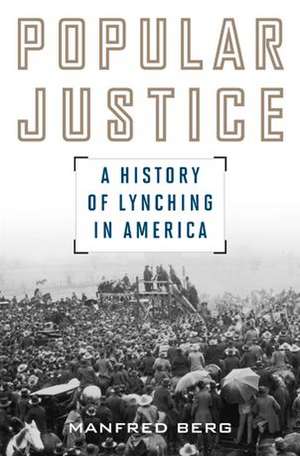Popular Justice: American Ways Series
Autor Manfred Bergen Limba Engleză Paperback – 3 mar 2015
Din seria American Ways Series
-
 Preț: 96.37 lei
Preț: 96.37 lei -
 Preț: 121.85 lei
Preț: 121.85 lei -
 Preț: 81.52 lei
Preț: 81.52 lei -
 Preț: 100.30 lei
Preț: 100.30 lei -
 Preț: 85.18 lei
Preț: 85.18 lei -
 Preț: 134.72 lei
Preț: 134.72 lei -
 Preț: 152.89 lei
Preț: 152.89 lei -
 Preț: 105.74 lei
Preț: 105.74 lei -
 Preț: 128.69 lei
Preț: 128.69 lei -
 Preț: 135.25 lei
Preț: 135.25 lei -
 Preț: 122.23 lei
Preț: 122.23 lei -
 Preț: 201.42 lei
Preț: 201.42 lei -
 Preț: 121.32 lei
Preț: 121.32 lei -
 Preț: 123.00 lei
Preț: 123.00 lei -
 Preț: 85.55 lei
Preț: 85.55 lei -
 Preț: 136.45 lei
Preț: 136.45 lei -
 Preț: 143.99 lei
Preț: 143.99 lei -
 Preț: 124.35 lei
Preț: 124.35 lei -
 Preț: 139.49 lei
Preț: 139.49 lei -
 Preț: 146.97 lei
Preț: 146.97 lei -
 Preț: 146.44 lei
Preț: 146.44 lei -
 Preț: 78.59 lei
Preț: 78.59 lei
Preț: 249.62 lei
Nou
Puncte Express: 374
Preț estimativ în valută:
47.76€ • 49.87$ • 39.53£
47.76€ • 49.87$ • 39.53£
Carte tipărită la comandă
Livrare economică 04-18 aprilie
Preluare comenzi: 021 569.72.76
Specificații
ISBN-13: 9781442245983
ISBN-10: 1442245980
Pagini: 232
Ilustrații: illustrations
Dimensiuni: 145 x 221 x 18 mm
Greutate: 0.32 kg
Editura: Rowman & Littlefield
Seria American Ways Series
ISBN-10: 1442245980
Pagini: 232
Ilustrații: illustrations
Dimensiuni: 145 x 221 x 18 mm
Greutate: 0.32 kg
Editura: Rowman & Littlefield
Seria American Ways Series
Notă biografică
Descriere
Manfred Berg traces the history of lynching in America from the colonial era to the present. Berg focuses on lynching as extralegal communal punishment performed by "ordinary" people. He confronts racially fragmented historical memory and legacies of popular justice to help the reader make better sense of lynching as part of American history.
